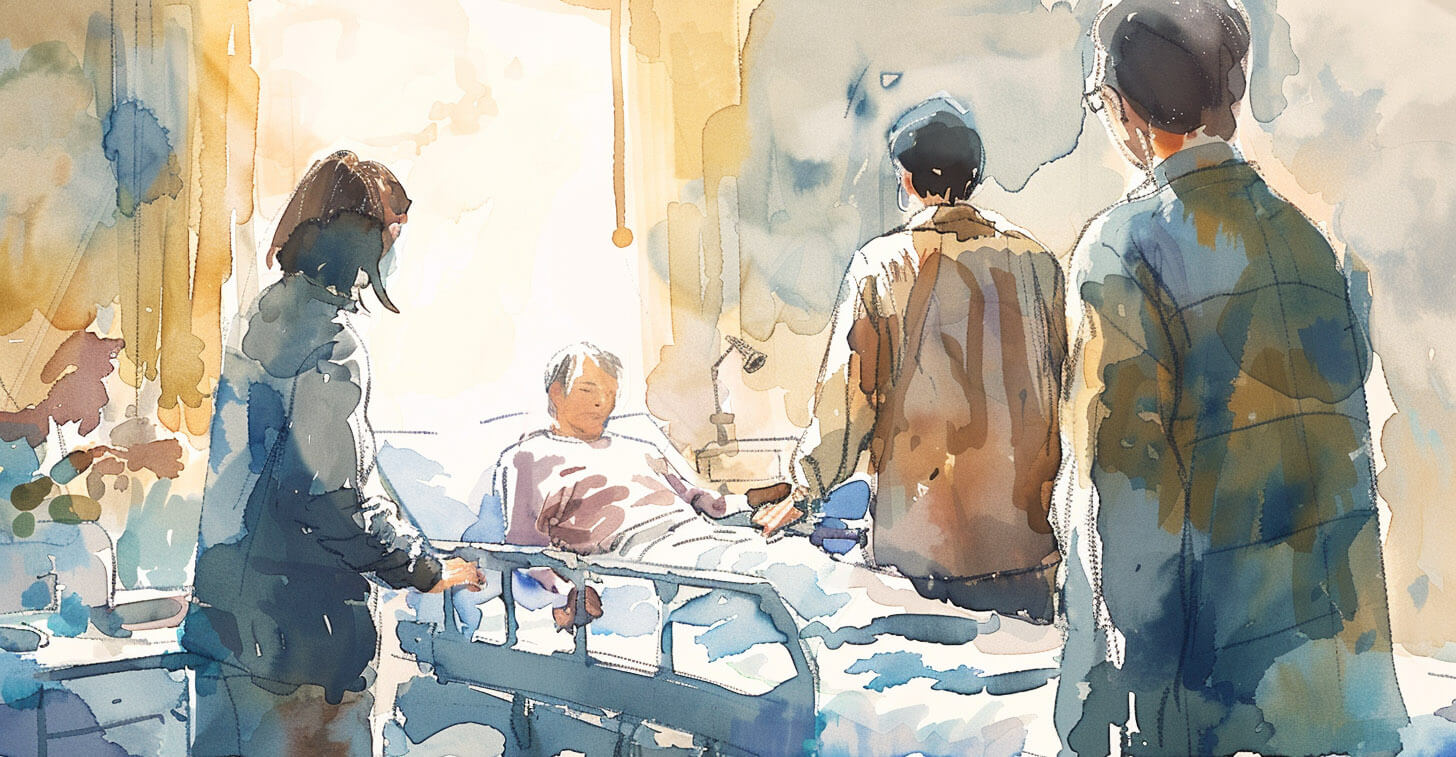A rabbi shares what he’s learned speaking with people in their final moments of life
Exploring the final moments before death is a reminder of what really matters in life

A family surrounds a loved one at their deathbed in a hospital. Illustration by Midjourney/Benyamin Cohen
I have been at the bedside of many people in their final moments on earth. The experience can be either haunting or inspiring.
Ironically, my first experience of saying goodbye to someone I loved was as a 9-year-old boy. My grandfather was dying from lung cancer in Mount Vernon, N.Y., my father’s hometown. I remember the final moments as if they were yesterday.
The hospital did not allow children onto the patient floors. My dad went upstairs and I waited in the lobby of the hospital. I will never forget the elevator doors opening and seeing my grandfather, who was seated in a wheelchair, a tube underneath his nose to assist with his belabored breathing. My dad motioned for me to walk into the elevator as he pressed a button to keep the doors ajar.
Memories flashed through my mind. My grandfather bellowing “Holy smokes,” visits to our home for holidays, the thrill of sitting on the spinning table in the modest ’50s-style living room, leading the end of services on a Shabbat morning in the cavernous Brothers of Israel synagogue, or the moose head staring at me at night as I tried to fall asleep. The haunting beady animal eyes looked right at him as he lay in bed.
They were all good and lasting memories. I wished for one more hug and one more hour. I gave my grandfather a kiss and hug and stepped out of the elevator backwards not wanting to turn my back on my father or grandfather. I remember my grandfather gazing serenely and deeply at me with tears in his eyes softly smiling as the doors closed.
The role of the rabbi, and the family
Decades later as a congregational rabbi, I witness many final moments.
Many years ago, I visited a man I knew at a remote hospice in central Connecticut. He had a couple of adult children and a few grandchildren, but no one was there with him. It was one of the saddest moments I’ve experienced. I entered the stark and empty room where he lay all alone. As I held his hand and offered words of strength as he embarked on his journey to the next world, I sensed in him a feeling of remorse. Where was his family? He’d never wanted his life to end this way. I did my best to offer strength to him as I recited the confessional prayer, but as I left, I had this lingering emotional feeling that he was alone.
In contrast, one of the most uplifting images is when I arrive at the hospital and the person who is dying is surrounded by family. Words of love and songs of strength are shared. There is a distinct feeling in the room that despite the impending death of the person, he or she will live on in his family, friends, and everyone he or she has touched.
Just as the day a person is born is a mystery, so too is a day of death. We believe the body is only a vessel but the soul lives on forever. If I receive a call that someone is dying, I put everything aside to be present with the family. Even when someone is unconscious, their souls are very much alive. The words and prayers that we can share give the soul strength on their journey to the next world.
How should you spend those final moments with a loved one?
Here are some ideas to bear in mind and heart in the final moments of a person’s life. Reciting Psalms 121 and 130 and the phrase from the Torah, “God will send His angels to watch over you on your journey” will uplift the soul. Letting the person know how much you love them and will remember them, how they will always be a part of you, gives strength. I have found singing the Jewish prayer of Adon Olam one of the most powerful moments. More often than not, it awakens within the person a hidden spark of connection to God, amplified by the closing words of the prayer: “God is with me and I will not be afraid.”
I have seen people call out to loved ones in the days or moments before their body and soul separate. I have seen people wait for a loved one to arrive at their bedside, further testimony that the body may be dying but the soul is very much alive.
In truth, exploring the final moments before death is not intended to be depressing, but a reminder of what really matters in life. An ancient teaching of Jewish mysticism crystallizes this idea. The sensation of death can be compared to one of two metaphors: taking hair out of milk or thorns out of a bush. One is easy and the other is painful.
When a person leads a life defined by the pursuit of physical pleasure, it is painful to die. On the final day, he or she sees the truth, hears the inner voice, and realizes the folly of their investments, for the body is dying and will not live on. They experience deep regret for not prioritizing life in a soulful way. On a deeper level, the soul doesn’t want to leave, for we realize that we could have and should have done more.
Looking at the day of death can awaken us to invest more fully in life. Each of us possesses an inner voice beckoning us and pushing us towards greatness. Do we hear that voice and do we invest in it?
The more we lead our lives in tune with this higher frequency, the more fulfilled our lives will be now and forever. Final moments on earth are a stirring reminder of the brevity of life and the awesome responsibility we all share to eternalize every moment and sanctify every encounter.
A message from our Publisher & CEO Rachel Fishman Feddersen

I hope you appreciated this article. Before you go, I’d like to ask you to please support the Forward’s award-winning, nonprofit journalism so that we can be prepared for whatever news 2025 brings.
At a time when other newsrooms are closing or cutting back, the Forward has removed its paywall and invested additional resources to report on the ground from Israel and around the U.S. on the impact of the war, rising antisemitism and polarized discourse.
Readers like you make it all possible. Support our work by becoming a Forward Member and connect with our journalism and your community.
— Rachel Fishman Feddersen, Publisher and CEO






























